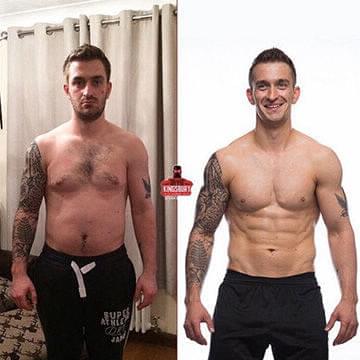Cortisol – Why It Matters
When it comes to health and fitness, it’s easy to concentrate on the areas you can see. Whilst things like the exercise you do, the food you eat and the sleep you have are fairly easy to manage, they’re areas of your life you can easily control. There are, however, other aspects that are just as important that often get overlooked because they’re not quite as obvious. One of those is cortisol, but what is it and why does it matter? Let’s take a look.

Cortisol is often referred to as the ‘stress hormone’ because of the way it influences or modulates the changes the body goes through when under stressful conditions, commonly known as the ‘fight or flight’ response.
When we are under pressure, cortisol is produced in the adrenal glands and secretion of it is controlled by the adrenal and pituitary glands and by the hypothalamus. This means that the flow of glucose to your tissues and bloodstream is increased to give you the short-term energy boost the body thinks you need. There are many cortisol receptors in your body and, as such, it can affect a wide range of your bodily functions. This can include your blood sugar levels, anti-inflammatory actions, blood pressure and your fat, protein and carbohydrate metabolism, which helps to maintain your blood glucose levels.
If those biological stress controls aren’t enough, when it comes to exercise and training, cortisol can also impact on your gym sessions. If you’re not making the progress you think you should be making, cortisol might be part of the problem.
There’s no getting away from the fact that living in this modern world can be stressful. When we have to balance our home life, work, family, friends, money and a million other things we have to deal with, finding time for yourself to exercise is hard enough, but it’s even harder to leave all those other things behind and focus purely on your training.
With all these stressors, cortisol will build up and that can affect the progress you’re working so hard to achieve. It’s important to say that cortisol in itself isn’t a cause for concern, but it’s when it reaches excessive levels that problems can occur.
Excessive levels of cortisol can mean that our utilisation of glucose is reduced, our immunity suffers, increases in abdominal fat, reduced muscle mass and even osteoporosis. If training and exercise are a key part of your life, then you will see from these implications why it’s important to control the level of cortisol you have in your system, and the good news is that you can do that. If you’re reading this, you’re probably half-way there already.
As with many of life’s problems, you can help yourself by undertaking regular exercise and eating a healthy, balanced and nutritional diet. When you exercise, you release our old friends, endorphins. Proving your nutritional needs are met, the endorphins will offset any cortisol in your system through carbohydrates, combined with some post-workout protein, will help to replenish your glucose and nitrate levels. Cortisol will be brought back to ‘normal’ levels much sooner this way.
Because of cortisol’s links to stress, trying to maintain a lifestyle that is free from it entirely might be a bit of a stretch for most of us, but learning to relax more and getting more quality sleep will go a long way to helping. If you are sleep-deprived, then cortisol levels are higher because your body is in an almost constant state of alertness. By getting a good night’s sleep of at least 8 hours, will bring levels down and also help to repair and replenish your muscles, tissue and organs.
To keep your cortisol levels in check probably means doing what you’re doing already; eating well, exercising often and sleeping better. If you’re going through a particular difficult period, then any of these things can be affected. Try not to let them get to you and remember what keeps you well and do that as often as you can.
Try these two techniques
Instant Cortisol Save breathing technique
- Sit comfortably with your back straight. Put one hand on your chest and the other on your stomach.
- Breathe in through your nose. The hand on your stomach should rise. The hand on your chest should move very little.
- Exhale through your mouth, pushing out as much air as you can while contracting your abdominal muscles. The hand on your stomach should move in as you exhale, but your other hand should move very little.
- Continue to breathe in through your nose and out through your mouth. Try to inhale enough so that your lower abdomen rises and falls. Count slowly as you exhale.
- Continue for 5-10min and feel the stress melt away
Put your Feet Up
We’re not talking having a lazy time and letting all your efforts go to waste, but a great quick way to improve your overall health. This is a brilliant 5 minute drill for reducing cortisol, boosting digestion and reducing anxiety. In yoga or meditative circles it is known as Viparita Karani, or the more suitable ‘Legs Up The Wall’ pose!
- Lie on the floor near a wall and practice deep, steady breathing.
- Exhale and swing your legs up onto the wall so that your heels and sitting bones are supported against it. Looking from the side, you’d look like a ‘L’
- If you have any discomfort in your lower back, adjust your body slightly back from the wall so that your sitting bones are not touching it.
- Rest your head on the mat or floor, keeping your spine straight, and bend your knees a little so your kneecaps won’t lock. Keep your arms stretched out to the side.
- Once in the position, close your eyes for anywhere between 5 and 15 minutes.
It might be a new exercise to you, but I guarantee you’ll feel great after doing it.
Get your cortisol under and get on top of your results.










